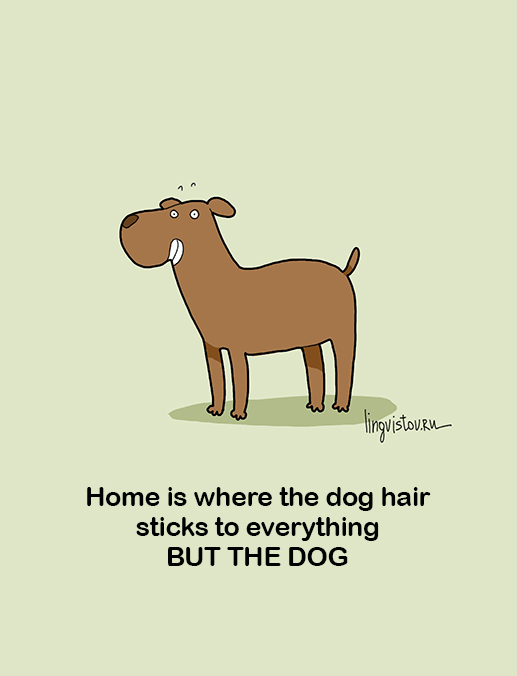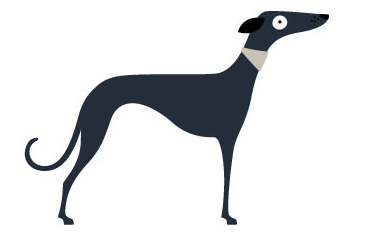Listening & vocabulary
В английском языке очень распространены устойчивые выражения и поговорки, включающие слово «dog» (собака). Среди них встречаются похожие на русские. Например, dog-tired (усталый, как собака) или a dog’s life (собачья жизнь).
Выполните задание по аудированию. Попробуйте догадаться о значении еще 10-ти выражений до прослушивания текста, выполнив предлагаемый тест на соответствие фраз их толкованию. Если это сложно, сначала прослушайте аудио запись. Кстати, она звучит на 30% медленнее, чем обычная американская речь.(credit to:
learningenglish.voanews.com)
Дополнительное задание: какое выражение, отсутствующее в тесте, объясняется в конце звучащего текста?
- lead a dog’s life – вести несчастную (собачью) жизнь; влачить жалкое существование
- dog-eat-dog – беспощадный (о конкуренции), звериный, волчий, жестокий, злобный; человек человеку – волк
- work like a dog – работать очень упорно
- dog-tired – очень-очень уставший; «устал, как собака»
- sick as a dog – очень больной
- every dog has its day – у каждого бывает светлый день; придёт и твой день; «будет и на нашей улице праздник»
- you can’t teach an old dog new tricks – старую собаку новым фокусам не научишь (т.е. в старости поздно переучиваться)
- bark is worse than one’s bite – лает, но не кусает — используется в отношении кого-либо, кто не настолько плох, как кажется; от него (от неё и т.д.) больше шума, чем вреда; больше бранится, чем на самом деле сердится
- in the doghouse – в немилости, в опале; быть объектом злости или раздражения
- let sleeping dogs lie – не буди лиxa, пока лиxo спит
- dog days of summer – самые жаркие дни лета; летняя жара
- rain cats and dogs – проливной дождь, ливень; льет, как из ведра
Американское произношение:
Americans use many expressions with the word dog. People in the United States love their dogs and treat them well. They take their dogs for walks, let them play outside and give them good food and medical care. However, dogs without owners to care for them lead a different kind of life. The expression, to lead a dog’s life, describes a person who has an unhappy existence.
Американцы используют много выражений со словом «собака«. Люди в США любят собак и хорошо с ними обращаются. Они выводят своих собак на прогулки, дают им поиграть на воле, хорошо кормят и лечат. Однако собаки без заботливых хозяев ведут совершенно другую жизнь. Выражение «жить как собака» (to lead a dog’s life) относится к человеку, чьё существование несчастно.
Some people say we live in a dog-eat-dog world. That means many people are competing for the same things, like good jobs. They say that to be successful, a person has to work like a dog. This means they have to work very, very hard. Such hard work can make people dog-tired. And, the situation would be even worse if they became sick as a dog.
Некоторые говорят, что мы живем в «мире с волчьими законами» (dog-eat-dog world). Это означает, что многие конкурируют за одни и те же вещи, например — за хорошую работу. Они же говорят: чтобы достичь успеха, человек должен работать, как вол (собака) (work like a dog). Это означает, что работать приходится упорно и много. Такой тяжелый труд делает людей усталыми как собака (dog-tired). Что ещё хуже, можно тяжело заболеть (sick as a dog).
Still, people say every dog has its day. This means that every person enjoys a successful period during his or her life. To be successful, people often have to learn new skills. Yet, some people say that you can never teach an old dog new tricks. They believe that older people do not like to learn new things and will not change the way they do things.
И всё же говорят, что у каждой собаки бывает счастливый день (every dog has its day). Это означает,что у каждого бывает счастливый период в жизни. На пути к успеху людям часто приходится осваивать новые навыки. Однако порой говорят, что старую собаку не научишь новым трюкам (you can never teach an old dog new tricks). Такие считают, что старые люди не любят обучаться новому и менять привычные приемы.
Some people are compared to dogs in bad ways. People who are unkind or uncaring can be described as meaner than a junkyard dog. Junkyard dogs live in places where people throw away things they do not want. Mean dogs are often used to guard this property. They bark or attack people who try to enter the property. However, sometimes a person who appears to be mean and threatening is really not so bad. We say his bark is worse than his bite.
Некоторых людей сравнивают с собаками в плохом смысле. Про людей недобрых и бездушных могут сказать «злой как собака на свалке» (meaner than a junkyard dog). Такие собаки живут на свалке, куда выбрасывают ненужные вещи. Злые собаки часто используются для охраны свалок. Они лают и нападают на людей, если они пытаются проникнуть на свалку. Однако порой с виду злой и грозный человек на деле не таков. Мы говорим, что он больше лает, но не кусает (his bark is worse than his bite).
A junkyard is not a fun place for a dog. Many dogs in the United States sleep in safe little houses near their owners’ home. These doghouses provide shelter. Yet they can be cold and lonely in the winter.
Свалка — нелегкое место для собак. Многие собаки в США спят в безопасных конурах рядом с хозяйским домом. Конура защищает от непогоды. Всё же зимой в них холодно и одиноко.
Husbands and wives use this doghouse term when they are angry at each other. For example, a woman might get angry at her husband for coming home late or forgetting their wedding anniversary. She might tell him that he is in the doghouse. She may not treat him nicely until he apologizes. However, the husband may decide that it is best to leave things alone and not create more problems. He might decide to let sleeping dogs lie.
Когда муж и жена ссорятся, они сравнивают свой дом с конурой (doghouse). Например, женщина может разозлиться, если муж поздно вернулся или забыл о годовщине свадьбы. Она может сказать ему, что он в опале (прогнан в конуру) (in the doghouse). Она может быть к нему нелюбезна, пока он не извинится. Между тем муж может решить, что лучше все оставить как есть и не создавать новых проблем. То есть может решить не будить лиxa, пока лиxo спит (to let sleeping dogs lie).
Dog expressions also are used to describe the weather. The dog days of summer are the hottest days of the year. A rainstorm may cool the weather. But we do not want it to rain too hard. We do not want it to rain cats and dogs.
Выражения со словом «собака» также используются при описании погоды. Собачьи дни лета (dog days of summer) — самые жаркие дни года. Гроза порой освежает погоду. Но мы не любим слишком сильных дождей. Мы не хотим, чтобы дождь лил как из ведра (rain cats and dogs).
This VOA Special English program, WORDS AND THEIR STORIES, was written by Jill Moss. I’m Faith Lapidus.
Это программа «Истории слов». Автор — Джил Мосс, ведущая — Фейт Лэпидус.
СМ. ТАКЖЕ:
- go to the dogs – ухудшаться, становиться хуже
- hair of the dog – немного алкоголя, чтобы опохмелиться
- make a dog’s dinner of [something] – устроить бардак, провалить дело
- Английские идиомы со словом dog (собака)
Англичане используют много выражений со словом dog, русские тоже не отстают и в своей речи часто упоминают этого верного друга человека. Да и вообще в любом языке много идиом, содержащих название того или иного животного.
Жители Соединенного Королевства любят своих домашних животных и заботятся о них. Англичане выгуливают своих питомцев, кормят их и обеспечивают медицинской помощью.
Однако собаки, не имеющие хозяев, ведут совсем другую жизнь.
Выражение to lead a dog’s life (вести собачью жизнь) означает, что человек ведет несчастливую, тяжелую жизнь.
Некоторые люди говорят, что мы живем в мире, где человек человеку волк – dog—eat—dog world. Это означает, что люди соревнуются, чтобы получить хорошую работу и т.д.
Говорят, чтобы преуспеть в жизни, нужно много работать – to work like a dog (трудиться как собака). А если заболеешь, то дела будут обстоять и того хуже – to be sick as a dog (заболеть как собака).
Однако, нужно надеяться, что и на нашей улице будет праздник –every dog has its day (у каждой собаки есть свой день). Это выражение означает, что у каждого человека бывают счастливые периоды в жизни.
Но, чтобы быть успешным, нужно многое уметь и знать. Хотя
некоторые люди говорят, что старого человека трудно научить чему-то новому – you can never teach an old dog new tricks (старую собаку новым трюкам не научишь).
А еще людей часто сравнивают с собаками. Про неприятного, недоброго человека говорят «злой как собака» — meaner than a junkyard dog (junkyard – помойка).
Однако, некоторые люди не такие уж и плохие, хоть и ведут себя зло и агрессивно – his bark is worse than his bite (его лай хуже, чем его укус). В русском языке есть соответствующая поговорка — не бойся собаки брехливой, а бойся молчаливой.
Помойка – не лучшее место для собаки. Но собаке, у которой есть хозяин, повезло – у нее есть уютный домик – будка (doghouse). Однако супруги используют это слово, когда злятся друг на друга. Если жена обижается на мужа, она может сказать, что объявляет ему бойкот – he is in a doghouse, пока он не извинится. А муж может решить, что лучше извиниться, чем продолжать ссориться – let sleeping dogs lie (не будите спящую собаку). В русском языке опять-таки есть похожее выражение – не буди лихо, пока тихо.
Даже в выражениях описывающих погоду, англичане тоже вспоминают самого верного друга человека. Например, the dog days of summer – самые жаркие дни лета, а о проливном дожде они могут сказать «it’s raining cats and dogs«. Даже перевода адекватного не подберешь.
Ну а теперь давайте воспользуемся видео-курсом службы BBC Learning English и познакомимся с новыми идиомами со словом dog и закрепим то, что уже знаем.
Идиомы этого урока:
To be in a doghouse — быть в опале
The hair of the dog — спиртное на опохмелку
To make a dog’s dinner of something — устроить бардак, провалить дело
Полный текст урока вы можете найти здесь
Ролик видео-курса об идиомах «The Teacher»:
А еще на моем блоге есть не менее интересная статья об идиомах со словом cat.
Другие страницы, которые могут быть вам интересны:
Словари он-лайн
Разница в употреблении слов another и other
The listening lesson “Thor to the Rescue” is about a very smart dog in my neighbourhood.
Many language learners are familiar with the expression “It’s raining cats and dogs”, but there are many more expressions in English with ‘dog’ in them.
Here are 13 more phrases and expressions with ‘dog’:
The doggy paddle
This is the first movement all children learn when they learn to swim! Have you ever seen a dog trying to swim in water? It moves its legs back and forth very quickly. When humans do the same movement in the water, it’s called ‘the doggy paddle’!
A dog and pony show
When you do something just to impress someone, such as your boss or someone important, it’s called ‘a dog and pony show.’
What is the point of this meeting? This is nothing but a dog and pony show.
The top dog
= The boss, leader or anyone in a position of authority.
Congratulations on your promotion! Now you’re the top dog around here!
The dog days of summer
It gets very hot in the months of July and August in North America. It is the height of summer. This time period is called ‘the dog days of summer.’
We go up north to our cottage in the dog days of summer. It’s much cooler up there.
dog-eared [adjective]
If a book or magazine ‘dog-eared,’ it is well-used and many pages have turned down corners. Often when people want to mark a spot in a book, they turn down the corner of the page.
She gave me her dog-eared copy of Little Women to read.
Fight like cats and dogs
= To fight all the time, sometimes viciously.
We used to fight like cats and dogs when we were young!
Be in the dog house [with someone]
If you are in the dog house with someone, you are in a lot of trouble with them!
Work like a dog
= To work very hard.
I need a rest. I’ve been working like a dog all week.
You can’t teach an old dog new tricks!
= It’s difficult to change old habits or behaviour, or learn new things
My mother isn’t very good with computers. You can’t teach an old dog new tricks!
Let sleeping dogs lie!
= Don’t talk about something bad that happened in the past, especially if it’s going to cause an argument.
Why are we talking about something that happened 10 years ago? Just let sleeping dogs lie!
It’s a dog-eat-dog world
= It’s a ruthless, vicious, competitive world – especially in business. Some people will do whatever it takes to get ahead or be successful, even if it hurts people around them.
We used to be friends, but he said terrible things about me so he would be promoted and not me. It’s a dog-eat-dog world out there!
Every dog has its day.
= Everyone will achieve success or happiness at some point in their life. This is usually said to someone to motivate and encourage them if they feel like they won’t be successful.
One day, all your hard work will pay off. Every dog has its day!
Gone to the dogs
= Something is not as good as it used to be.
We don’t go to that restaurant anymore. It used to be great but it has really gone to the dogs.
Do you have any phrases or expressions in your language with ‘dog’ in them?
Here is a list of idiomatic expressions using the word dog.
As crooked as a dog’s hind leg
If somebody is as crooked as a dog’s hind leg, they are very dishonest.
- You can’t trust him. He is as crooked as a dog’s hind leg.
As sick as a dog
If somebody is as sick as a dog, they are very sick.
- I was as sick as a dog when I reached home last night.
It is better to be a live dog than a dead lion
This is from the Bible.
- I was really angry with him, but I chose not to fight. After all, it is better to be a live dog than a dead lion.
Dog and pony show
A dog and pony show is something that marketers organize to impress customers.
Dog-eat-dog
This expression is used to refer to a situation where people are ready to hurt each other to get what they want.
- In the dog-eat-dog world of consumer electronics, it simply isn’t easy for a startup company to break even.
Dog in the manger
Used to refer to a person who wouldn’t let others do what he himself wouldn’t do.
- My landlady is a dog in the manger. She would never invite anyone into her home. She wouldn’t let me either.
Every dog has his day
Everybody will get an opportunity to prove their mettle.
- Don’t lose heart. Every dog has his day. You, too, will get an opportunity someday.
Fight like cats and dogs
They were fighting like cats and dogs all the time they were together.
Go to the dogs
When a business goes to the dogs, it fails.
- Thousands of people lost their jobs when the company went to the dogs.
Ваше имя*:
Телефон*:
* Поля, обязательные для заполнения
Если Вы хотите принять участие в Марафоне: Английский каждый день, оставьте Ваше имя и номер телефона и мы свяжемся с Вами в ближайшее время
Есть любители кошек, есть любители собак. Мы являемся фанатами и тех, и других, особенно когда находим связь между ними и нашей страстью к языкам. Двойное удовольствие! Так, мы уже представляли вашему вниманию Английские идиомы со словом cat. Теперь наш долг дополнить ее статьей, где мы приведем самые полезные и часто встречающиеся в речи английские идиомы с dog. Английских идиом с dog, а также пословиц со словом dog довольно много. И они могут иметь совершенно разнообразные значения.
Английские идиомы с Dog:

Should I ask the boss if he’s upset at my coming in late in the mornings? — If he hasn’t said anything about it, just let sleeping dogs lie.
Стоит ли мне спросить у начальника, расстроило ли его то, что я поздно пришел утром? — Если он ничего не сказал об этом, лучше не буди лихо, пока оно тихо.The tail wagging the dog — хвост вертит собакой; куда хвост, туда и пес
My boss tried to make everyone wear black shoes to work, but some of the other workers complained and he changed his mind. — That sounds like the tail wagging the dog!
Мой начальник пытался заставить всех носить черную обувь на работу, но некоторые из других рабочих пожаловались, и он передумал. — Похоже, хвост вертит собакой!Barking up the wrong tree — обвинять не того, кого следует; обратиться не по адресу
He had nothing to do with the robbery — the cops are really barking up the wrong tree this time.
Он никак не связан с кражей. Полиция обвиняет не того, кого следует.You can’t teach an old dog new tricks — старую собаку не научишь новым фокусам
His grandmother avoids using the microwave oven — you can’t teach an old dog new tricks.
Его бабушка избегает использовать микроволновку. Старую собаку не научишь новым фокусам.Every dog has its day — будет и на нашей улице праздник
Don’t worry, you will become famous someday. Every dog has his day.
Не волнуйся, ты когда-нибудь станешь знаменитой. Будет и на твоей улице праздник.Work like a dog — вкалывать, работать как вол, работать как лошадь
He worked like a dog all day to finish the project.
Он работал как лошадь весь день, чтобы закончить проект.be as sick as a dog — чувствовать себя скверно
She was as sick as a dog after eating the stake.
Она чувствовала себя совсем дурно, после того как съела стейк.A barking dog seldom bites — Собака, что лает, редко кусает.
Old Mrs. Smith keeps saying she’ll call the police if we walk on her lawn, but don’t worry. A barking dog seldom bites.
Старая миссис Смит постоянно говорит, что вызовет в полицию, если мы будем ходить по ее газону, но не волнуйся. Собака, что лает, редко кусает.dog-eat-dog — человек человеку волк, волчий закон
This is a dog-eat-dog world.
Это мир, который живет по волчьим законам.a dog’s breakfast/dinner — беспорядок, бардак, жуть, катастрофа
He tried to cut her hair and made a real dog’s breakfast of it.
Он попытался постричь ей волосы, но у него получилась полная ерунда.
That bedroom looks like a dog’s breakfast.
Эта спальня выглядит как свалка.be like a dog with a bone — не переставать думать или говорить о чем-то
On the subject of women’s rights, she’s like a dog with a bone.
Она не переставала говорить о правах женщин.like a dog with its tail tucked under — как собака с поджатым хвостом
He acted so brave at the beginning but then escaped like a dog with its tail tucked under.
Он вел себя так смело вначале, а потом убежал как собака с поджатым хвостом.be like a dog with two tails — рад-радёшенек
Our team won the match. The captain was like a dog with two tails.
Наша команда выиграла матч. Капитан был рад-радёшенек.call off the dogs — отозвать собак (переменить неприятную тему разговора), сменить пластинку
It’s time to call off the dogs and let her get back to doing her job.
Пора сменить пластинку и дать ей вернуться к работе.dog ate my homework — собака съела (плохая оправдание того, что что-то не было вовремя сделано, например, домашняя работа, отчет и пр.)
The dog ate my homework, so I have nothing to turn in.
Мою домашнюю работу съела собака, поэтому мне нечего сдать.Dog does not eat dog — волк волка не съест
l want to hire another lawyer. — You’ll never find a lawyer to take on that job. Dog does not eat dog.
Я хочу нанять другого адвоката. — Ты никогда не найдешь адвоката, который возьмется за эту работу. Волк волка не съест.dog’s life — собачья жизнь, жалкое существование
He’s been leading a dog’s life since his wife left him.
Он вел жалкое существование с тех пор, как жена ушла от него.fight like cat and dog — спорить и драться с кем-то, жить как кошка с собакой
We get on very well as adults but as kids we fought like cat and dog.
Мы хорошо ладим друг с другом во взрослой жизни, но, когда были детьми, мы жили как кошка с собакой.go to the dogs — идти к чертям, пойти псу под хвост
He was a marvelous actor, but his drinking problems caused his career to go to the dogs.
Он великолепный актер, но его проблемы с алкоголем привели к тому, что его карьера пошла ко псу под хвост.It’s not my dog (= It’s not my problem) — это не моя проблема
So what! It doesn’t matter! Not my dog.
И что? Наплевать. Не моя проблема.lucky dog — счастливчик, везунчик
You won the lottery? You are a lucky dog!
Ты выиграл в лотерею? Везунчик!see a man about a dog — зайти в одно место (в туалет)
I don’t know where Jim is. He said he had to see a man about a dog.
Не знаю, где Джим. Он сказал, что пошел в одно место.the dog days — пекло, самые жаркие летние дни
At times, during the dog days of summer, the river dries up completely.
Временами в течение самых жарких летних дней река полностью высыхает.the hair of the dog (that bit you) — порция спиртного для того, чтобы опохмелиться
Paul offered me the hair of the dog, but I couldn’t stand the thought of drinking any more.
Пол предложил мне спиртного, чтобы опохмелиться, но одна мысль об алкоголе меня выворачивала.the top dog — лидер, босс, авторитет, вожак
Jackson was top dog and he made sure he got what he wanted.
Джексон был авторитетом и позаботился о том, чтобы всегда получать то, чего захочет.throw to the dogs — выбросить что-л. к чертям собачьим; бросить за ненадобностью
If Louise doesn’t achieve as they expect, they’ll throw her to the dogs.
Если Луиза не достигнет того, что от нее ожидают, ее бросят к чертям собачьим.Если вам понравились Английские идиомы с dog, то вас обязательно порадуют наши статьи «Английские идиомы на костях» и «Английские идиомы: Еда». Следите за обновлениями блога Лингвистов. Не пропустите самое интересное!
© Ландыш
Khidirova Makhfuza Amirkulovna,
The teacher of Termez state university
Phraseology is a study of set or fixed expressions, such as idioms, phrasal verbs, and other types of multi-word lexical units.The theory of phraseology was laid in the works of A.A. Potebni, A.A.Shakhmatov,F.F.Fortunatov, E.D. Polivanova, S.I. Abakumova, and L.A. Bulakhovsky.
Animal component serves to highlight entities that play a role in people’s daily life, and to establish and maintain an individuality in society. Object of analysis of onomastics, animal component have been investigated by philosophers, logicians, anthropologists and psychologists, linguists. There are a great number of animal component in English phraseological units because of their great importance in human communication, where they are signs of cultural, linguistic, geographical, ethnic and social identity. Their analysis can offer an insight into the interplay between language and culture in phraseology.Among them phraseologies with dog play great role in human’s life.
Among all living-beings, only animals have particular habits, individual mode of life and type of behavior as human beings do. That is why words, which name the animals, are widely used by people to represent picturesque description of the inner world of the man and peculiarities of his behavior. Moreover, it is interesting for linguists that the names of the same animals can often imply different qualities in different languages, giving people completely opposite characteristics. For instance, in the Russian language — elephant symbolize a big, awkward man while for Indian people it has entirely opposite meaning: the elephant is a symbol of gracefulness, grace of movements. The word tortoise in Russian is the symbol of slow movements, but Chinese people use this word to denote an unfaithful wife. Some names of animals have stable picturesque content in one language and do not in another one. However, here we give some examples for phraseologies with the term dog:
· It is ill to waken sleeping dogs. Let sleeping dogs lie. — Do not wake up sleeping dogs. — Yopiq qozon yopiqligicha qolaversin. (Caution)
· Too much pudding will choke the dog. — Nafsi buzuq hayitda o’lar.(Greed)
· Every dog is a lion at home. — It ham o’z ko’chasida o’zini sher bilar. Xo’roz ham o’z katagida qichqiradi.(Arrogance, pride)
· Barking dogs seldom bite. — Itning indamasi yomon. Huradigan itlar kamdan-kam qopadi. Qopag’on it tishini ko’rsatmas.(Insolence)
· To live cat-and-dog life. — Live like a cat with a dog (always quarrel). — It mushukday yashamoq. Er — xotinning urushi, doka ro’molning qurishi.
It is obvious that in the category»Moral Qualities“, with dog terms the dominant for the ethnic mentality is caution as the most significant quality of character.
Thus, “Existence” the category of life experience dominates, which is an indicator of the empirical orientation of the assessment of the attitude to the characteristics of the national character. The least represented in the quantitative aspect are such components as everyday difficulties and bad luck, luck, but their presence also reflects certain linguistic peculiarities and features of the national character of the English.
· Better, be the head of a dog. — Arslonning dumi bo’lgandan ko’ra itning boshi bo’lgan afzal. Arslonnin go’ligi — sichqonning tirigi.( The situation in the society)
· The dog that trots about finds a bone. — Izlaganim kon topar. Qalovini topsang qor ham yonadi. ( Anxiety, fussiness)
· An old dog will learn no new tricks.-Qari it yangi hunar o’rganmas. It qarisa, yotgan yeridan xuradi. (Skills)
· One barking dog sets the whole street a-barking. — Bitta tirriq buzoq podani bulg’aydi.(Actions)
Thus, as a category “Behavior” dominant, one can single out the category characterizing human actions. Less categories are presented here such as punishment, censure and risk. However, all these categories to a certain extent reflect the characteristics of national thinking.Obviously, the most isolated in most categories are such lexical units as a dog among other animals.
Defining notions we suggest to consider the concept of the human’s character, which is representedby a significant number of paremies, which together constitute the “paremiological portret” of man (in our case, represented only by Uzbek and English paremias with the term “dog”). The following categories are included in the expanded classification: Moral qualities, Existence, Social, Emotional-mental states, Labor activity, Physical characteristics, Mental abilities, Moral and ethical ideas, Speech, Individuality.



.jpg)
.jpg)
.jpg)
.jpg)
.jpg)
.jpg)
.jpg)
